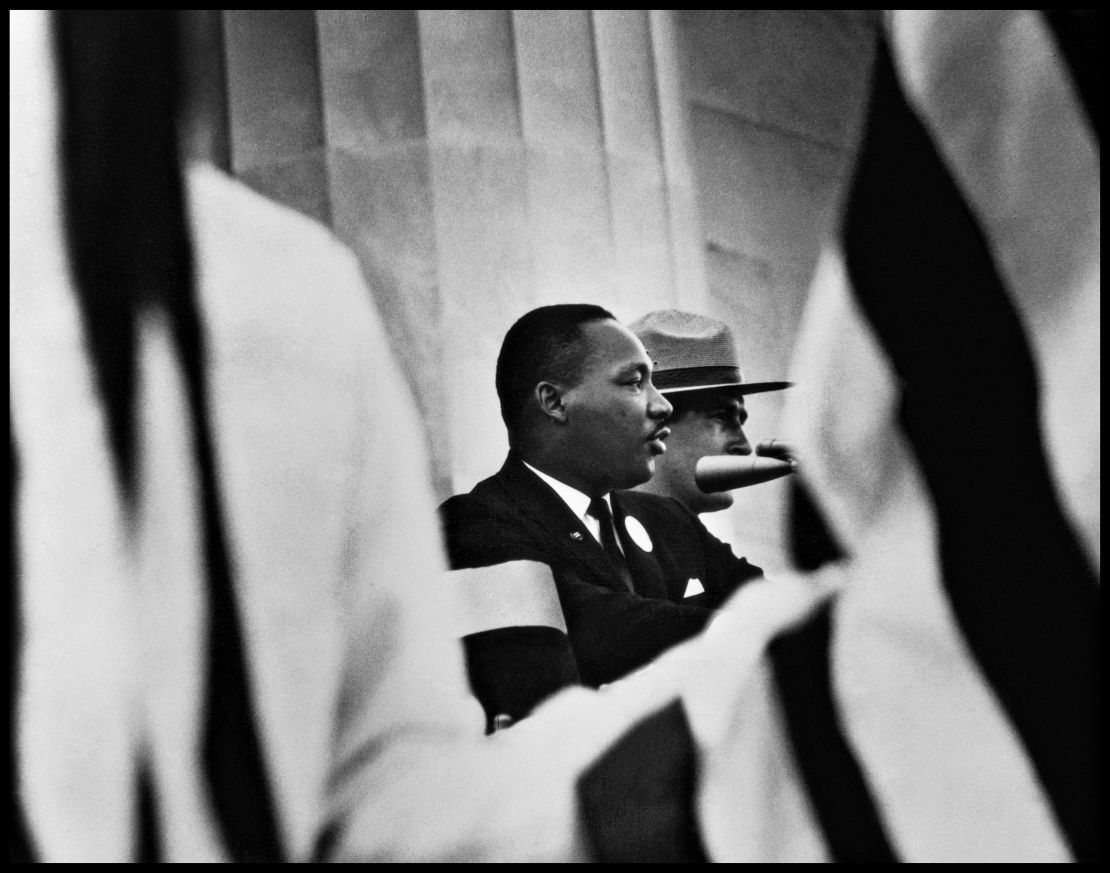Editor’s Note: Peniel E. Joseph is the Barbara Jordan chair in ethics and political values and the founding director of the Center for the Study of Race and Democracy at the LBJ School of Public Affairs at the University of Texas at Austin, where he is also a professor of history. He is the author of several books, most recently “The Sword and the Shield: The Revolutionary Lives of Malcolm X and Martin Luther King Jr.” The views expressed here are his own. View more opinion articles on CNN.
Friday’s March on Washington 2020, nicknamed by organizers “Get Your Knees off Our Necks,” takes place on the 57th Anniversary of the March On Washington. This year’s march, which is focused on ending police brutality by reimagining public safety, occurs amid a year of plague and moral and political reckoning surrounding Black citizenship and dignity.

MOW2020 is unfolding less than one week after Kenosha, Wisconsin, police shot a Black man, Jacob Blake, seven times in the back – leaving him paralyzed. Protests in Kenosha two nights later turned tragic when three people were shot, two fatally.
Police have since charged a 17-year-old, whose social media shows an affinity for Trump and guns, with homicide. Los Angeles Clippers Head Coach Doc Rivers spoke for much of Black America when he declared exhaustion from “loving a country that does not love us back.”
The symbol and substance of these recent events, including the work stoppage by NBA and WNBA players (as well as other professional athletes) in support of Blake, demands that the nation remember the promise and possibilities of Martin Luther King Jr.’s republic.
King’s “I Have a Dream” speech, typically recalled in a sepia-toned haze of nostalgia, planted less-remembered radical political seeds addressing racial slavery – the moral necessity of reparations, the need for shared political sacrifice – that are now flourishing in our own time.
On Wednesday, August 28, 1963, as King came to the podium erected in front of the Lincoln Memorial, he confronted both the grandeur of the dreams that sprung forth a century earlier in the wake of the Emancipation Proclamation and the travails of racial terror, Jim Crow segregation and dehumanization that had marked Black life since the heady days of Reconstruction.
Like many of today’s protests, the substance of King’s March on Washington speech called on the nation to come to grips with outstanding moral, political and economic debts owed to Black America. The “I Have a Dream” refrain near the speech’s close, where King went to church in front of a national audience, upstaged what should have been the most important takeaway.
King’s audacious call for reparations reflected the larger tenor of the demonstration, whose full title – The March on Washington for Jobs and Freedom – is too often shortened at the grave cost of historical context. March organizers, led by the social democratic activist Bayard Rustin, wanted nothing less than to usher in a new social compact between the federal government and Blacks.

From the nation’s capital, ensconced by an interracial crowd of a quarter of a million people, King sketched out a bracing vision of American democracy that could only be achieved by squarely facing the racial horrors of our national history.
King reminded the nation, “America has given the Negro people a bad check,” one that “has come back marked ‘insufficient funds.’” However, King professed faith in the nation’s capacity for a moral and political rebirth centered around Black citizenship and dignity. The movement descended upon the sacred ground of Washington, DC, “to remind America of the fierce urgency of now.”
The urgency of the moment required the kind of truth-telling that made White Americans uncomfortable, but King persisted, openly discussing the pervasiveness of police brutality against Black communities, the inequality of racial ghettoes and the necessity for White allies willing “to storm the battlements of injustice” across the nation.
King publicly called the state of Mississippi a place “sweltering with the heat of injustice” and characterized Alabama as dominated by “vicious racists” whose political leaders defied federal efforts to foster racial justice at every turn. He connected the Jim Crow of the South with the Northern style of segregation that proved no less injurious to generations of Black folk. “Nineteen sixty-three is not an end, but a beginning,” observed King.
The revolt that King characterized as only the beginning in 1963 has reached unprecedented and historic levels in 2020. Black Lives Matter protests in the wake of George Floyd’s killing on May 25 by the police galvanized millions of Americans, including Whites – the descendants of those who King implored to join in the fight to redeem the nation’s soul.
Outcries for justice for Breonna Taylor and Jacob Blake have sustained and given momentum to this social force, now further buoyed by the actions of professional athletes and everyday citizens.
Dr. King went further, documenting American history through Black lives, noting how the nation had transition from a republic of slavery, racial terror, and Jim Crow, but never into the republic of justice it proudly declared itself to be at home and abroad.
In outlining the litany of crimes against Black people that had been committed since the nation’s founding, King asked hard questions about the fate and future of American democracy.
Contemporary readers of the “I Have a Dream” speech might be shocked to discover how so much of the speech referenced directly or alluded to racial slavery. King viewed the centennial anniversary of the Emancipation Proclamation as the perfect timing for the nation to rediscover its original sin in order to move forward into a “Beloved Community” free of racial injustice, economic poverty, violence, and misery.
Dr. King’s republic, an America where the children of the formerly enslaved and descendants of those who viewed Blacks as property could “sit down together at the table of brotherhood,” rested on acquiring the national strength to endure a political and moral reckoning a century after slavery.
Unless Black America achieved citizenship, proclaimed King, the nation would experience no peace. “The whirlwinds of revolt will continue to shake the foundations of our nation until the bright day of justice emerges.”
Fifty-seven years after the March On Washington, America finds itself less at a crossroads than at a place with a chance for a new beginning. The opportunity to engage in the reparative work that King outlined in the shadow of the Lincoln Memorial will take the work of generations but must be done. The vision that King sketched that Wednesday afternoon in the nation’s capital echoes in our own time, amplified by tens of millions of voices in America and around the world who stress the fierce urgency of our own time.



